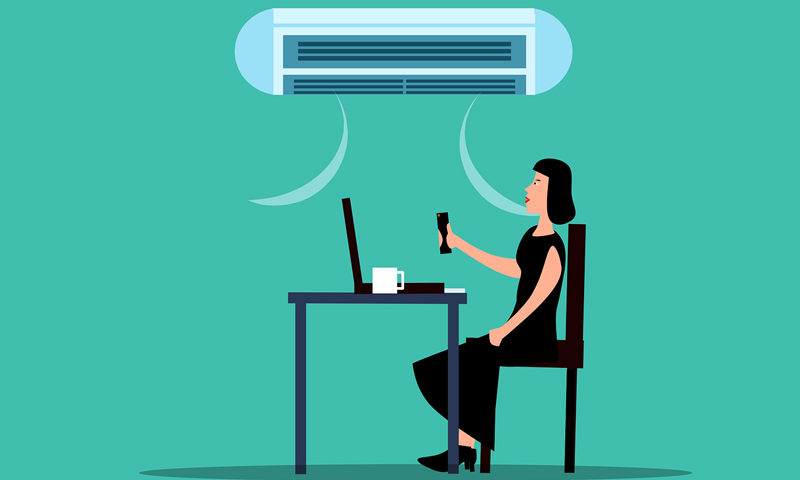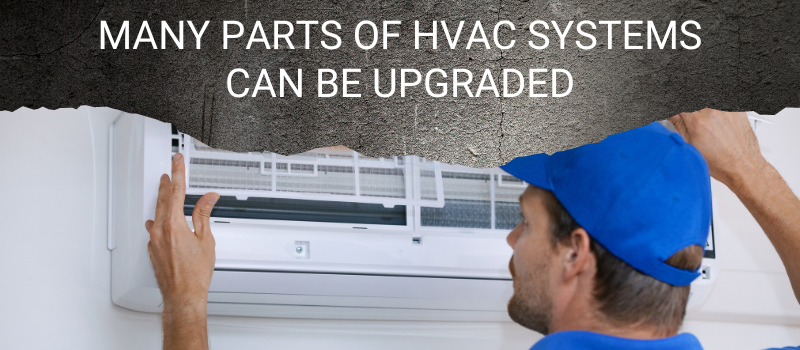Written by Industrial Stores Staff 02/22/23

There are a lot of steps one can take to improve the value of their house. Some common examples include increasing curb appeal, adding a fresh coat of paint, and renovating the bathroom or kitchen.
However, one of the most impactful changes you can make is to update your HVAC system. From maintaining the right temperatures automatically, to cleaning and freshening the air in your home, an updated HVAC system hugely improves the comfort of any home.
Updating the HVAC system also ensures that home inspectors give your home mechanical system a passing grade.
But before we get into how updating your HVAC system actually increases your home's value, here are some telltale signs that indicate it may be time for an update.
Old AC system (10–15 years)
Frequent, costly repairs
Unusual or loud noises
Rising or high energy bills
Imbalanced indoor temperatures
The following are three amazing ways how updating your HVAC system increases the value of your home.
1 - Minimizes Operational Costs
Accounting for nearly 40% of the total energy consumption of a building, HVAC systems are among the biggest energy consumers in a home. If you have an old, faulty air conditioner, you’re likely spending a lot of money on energy bills and frequent repairs.
Home buyers can easily pick up on this fact, which could impact your offer.
Upgrading to a new, modern HVAC system can help you reduce the amount of energy your systems are squandering by 50%, keeping maintenance costs minimal and potentially increasing the value of your house on the market.
An updated HVAC system will help reduce your maintenance and electricity bills in the following ways:
Technological advancements: Smart technology, for example, smart thermostats, can easily help reduce energy costs. Smart features allow you to control your AC remotely via an app on your smartphone or tablet, viewing your energy consumption in real-time and making adjustments as needed.
A better model for your home: When updating your HVAC system, you can install a more energy-efficient and cost-effective model. Apart from meeting the needs of your home, a new model may also be more environmentally friendly.
Fewer breakdowns: When you have a new HVAC system installed, it is less likely to break down. Newer models are designed to last longer than old ones, and they won’t have already endured years of use.
A low-maintenance but quality home has a high value on the market as buyers deem it worth every dollar.
2 - Older Equipment Deters Buyers
Old homes, especially in historic locations, tend to have a relatively high value. However, this does not mean the systems in the home need to be old and rusty.
Aesthetically, old systems are not appealing. The rusty, worn-out look can quickly devalue your home in the market as they give an impression of a poorly maintained home that will need significant input when renovating.
Also, old systems tend to be noisy and clanky because of their wear. A noisy HVAC system can be frustrating and annoying, potentially lowering a home’s value and discouraging buyers.
Damaged or old HVAC systems often produce loud bangs, clanks, or rattling noises. Sometimes, you can also feel intense vibrations that can be quite embarrassing if one has to always explain to their visitors where they are coming from.
These noises and vibrations mean that some parts of the system may be loose, broken, or worn out. The louder the noise, the more difficult it will be to sell your home.
A quick repair may fix the noise problem (just for some time), but what about the wear and tear?
In such situations, a full system upgrade is often needed if the problem is persistent.
Also, according to the 2019 Remodeling Impact Report, released by the National Association of REALTORS® (NAR), upgrading an HVAC system provides an 85% return on investment (ROI) by reducing energy costs and increasing the system's lifespan.
Modern systems also contain sound-dampening insulation that absorbs noise, keeping your system quieter than old HVAC models.
3 - 60% of Home Buyers Regard a Working HVAC System As an Essential Feature

According to a 2019 report by the National Association of Home Builders (NAHB), 60% of recent and prospective home buyers regarded HVAC systems as either essential or desirable.
More buyers are looking for a home with good indoor comfort, which includes good air quality and optimal temperatures.
And as you know, the primary purpose of the HVAC system is to provide comfort at home by maintaining a preferred temperature and good air quality.
The table below gives you an idea of the best range of temperatures you can set your thermostat to, depending on the time of year, to prevent thermostat wars in your home.
However, an old or broken system will not be able to maintain specific temperatures and air quality effectively. Issues such as inaccurate or damaged thermostats and motors, clogged filters, or low fluids could cause this.
After an HVAC system update, you'll notice an immediate increase in comfort as the chosen temperature will hold, and the air will be clean and fresh.
A comfortable home is good for your health and more valuable on the market.
Should I Do a Full HVAC System Replacement or Update a Few Parts?
If you’re in the market for a new HVAC system, there are two options: full replacement or updating parts of your current system.
Full HVAC System Update
A complete HVAC system replacement is the most comprehensive option. It involves removing your current system, installing a new one, and ensuring it’s properly connected to your home’s new ductwork.
However, this undertaking is quite costly and is only recommended if:
Your system is outdated and old, about 10–15 years
You have the budget - it is always recommended to plan and save for such big updates
The system is damaged beyond repair - this usually happens when no routine maintenance is done
The complete home is undergoing a major renovation, and you need a new HVAC system that matches the needs of the new home
A full replacement has the most advantages as it is a one-time investment, and you won’t have to worry about other issues for years to come.

Partial HVAC System Update
Besides full replacement, you can also consider a partial HVAC system update. This option is ideal for homeowners who want to maintain their current HVAC system but want to add some features or upgrades.
A partial update favors those who want to save money but still want the comfort and convenience of an updated system.
Many parts of an HVAC system can be upgraded. Some parts that offer a good return on investment include:
Smart thermostats: A smart thermostat allows you to control your HVAC system from anywhere using your smart device. It also provides a way to monitor energy usage. You'll be able to save on energy bills by making sure your system is only running when you need it to.
Air filters: A new air filter can make a big difference in the quality of air inside your home. New filters will efficiently filter dust, pollen, and other pollutants. The risk of respiratory illnesses and allergies decreases when you have clean air.
Upgrade to zoning: A zoning system can help you regulate the temperature in each room of your home. This allows you to heat or cool certain areas using separate units. This is a great way to save money since you’re able to use your air conditioner and furnace only in the rooms that need them most.
Ductwork: Ductwork, is essential for airflow in the home as it connects the HVAC unit to all the air vents in the house. Ductwork can be susceptible to mold, pests, weather-caused damage, and debris. Upgrading the ductwork creates an efficient airflow system for your home.
At Industrial Stores, we offer a wide range of HVAC equipment and accessories for your upgrades and repairs. Our fast shipping times are ideal for those needing their parts as soon as possible.
“... I ordered (6) RIBs on Tuesday and they came on Wednesday! Unheard of without paying for overnight shipping ... Thanks ...”
— Janet Wartschow
Visit our product page to see a list of our HVAC parts and accessories. Also, feel free to contact us if you need any help with your HVAC upgrades.
Share on Facebook: